“Acting, for me, is a joy and the power to relay various lives through myself,” says dramatic artist Mira Banjac, noting that she’s proud of all the women she’s portrayed. She most loved to interpret women of the people, which she viewed as a great responsibility
She had the honour of interpreting roles from everyday life, women one might meet on the street, but she also played roles in Shakespeare and G.B. Shaw. A diverse repertoire, but she nonetheless prefers domestic drama.
An acting star, diva, and one of the icons of the region’s acting scene, which she ennobles with her charisma, straightforwardness and kindness, she doesn’t perceive herself as having some special greatness, which is characteristic of great people, she’s simply an actress. An exceptional career, which has lasted since 1949, could be the envy of world greats of acting, as could her optimism and creative joy. She’s equally dedicated to leading and supporting roles, which are actually much harder to play in order for those “minor”, and in fact “major” roles, to provide that essential spice to a film, theatre or television story, without which such stories would not be complete. She has won all possible awards and accolades, but the greatest recognition for her is that she is an actress, and that she is able to perform for as long as she is called to do so, and for as long as her age permits.
Now in the tenth decade of her life, at the age of 93, her energy and passion for work has preserved her vitality, but also her great love and respect for acting and actors, though she’s aware that she’s now limited by age, no matter how unique she is. Her fascinating transformational power elevated her to the very top of acting, and her monodrama Ljubica, first person plural, determines the broad scope of her acting. That multiplicity is also reflected in her overall artistic work – actress, but also director, pedagogue and playwright, and she’s also present in all acting “media”: theatre, film, radio and television. She speaks about her life candidly, painfully, exceptionally…
You say that you weren’t exactly a desired child, yet your birth was still greeted by the sounds of a brass band?
That is one of life’s paradoxes. This unusual story is well-known: while my mother was giving birth to me, a fire brigade orchestra was playing under her window, and a trail of music resounded around our street. No one brought them to play for joy and rejoicing, and we never found out how they ended up being there.
You only discuss your childhood reluctantly?
It seems to me that I never was a child. I remember my Erdevik, my little village in Srem, and I’d rather forget the rest. My father was an American, who they brought to marry my beautiful mother, Olga, but that marriage didn’t last long. I was four years old when he left and headed back in America, with the promise that he would send for us. We didn’t know a word of English, and he didn’t know a word of Serbian. Following his departure, my mother also left, feeling surplus to requirements and unwanted in that house, and I was left to suffer and grieve her leaving. My Grandma and aunt on my father’s side would constantly yell at each other, arguing in English. I think that’s the reason I never learned that language, a psychological barrier. As soon as I would start speaking English, I would be met by the apparitions of my grandmother and aunt, and their quarrelling in that despised language long resounded in my ears. I never found out the reason for those arguments.
I applied for the audition with the support of my dear teacher, who encouraged and instilled confidence in me. I knew that actresses were supposed to be beautiful, prim and proper, nicely dressed, and I was none of that. The fact that I wasn’t beautiful worried me less than my outfit: an English blouse, some horrible trousers and a shawl. It was the best I had
You lacked many things as a child – family, mostly your mother, beautiful things?
It was neither nice nor pleasant at my grandmother’s house. I felt as though I didn’t belong there. I was comforted by the belief that I wouldn’t stay there forever, that my life would change. How? I didn’t have an answer to that question, which I often posed to myself. I knew that it would happen “somehow”, as was the case and as often happens. I didn’t have anything of my own: all the beautiful things I had were passed down from others. I wasn’t particularly good at coping; I was lonely, unhappy, sad… Despite that, deep down in my soul there was some spark of hope that a turning point in my life would come and that I would leave these days far behind me; that I won’t even want to remember them. That was my vision, which helped me endure the difficult days, leave everything behind me and await the arrival of a better tomorrow, which I patiently awaited and ultimately welcomed.
You were already witty back then, while you say you were also cheeky. Was that your defence mechanism?
I often acted “crazy” at school, placing corn silk in my hair, sitting proudly as though I had a crown on my head, while the whole class screamed with laughter. Everyone laughed except my teacher, who understood me, who found it sad and not funny. I was also capable of being naughty, to play the clown in exchange for the bike I asked to borrow from my friend, the only one in the village who had one, to ride it for a while.
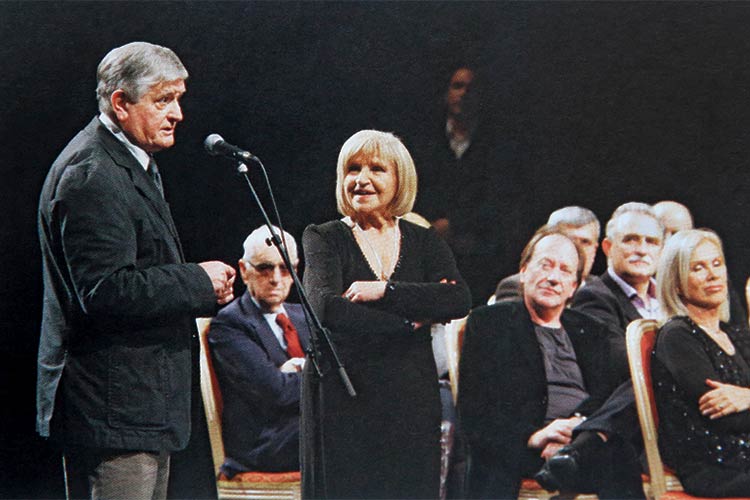
I would perform for her, and she would let me ride her bike – that was the deal. Back then, having a bicycle was like having a Porsche or a luxury car, and her riding around got on my nerves. I’d never ridden a bicycle before, and once I got my hands on it I didn’t return it to her until the evening. That satisfied my curiosity for all time and I later never had a desire to ride or own a bike.
One of the important decisions you made was to find your mother, who lived in Belgrade. You didn’t even know where she lived, and you weren’t familiar with Belgrade?
Life is full of tribulations. My aunt travelled back to America, my grandmother died, and I was left alone. I decided to go to Belgrade to find my mother. I had the good fortune, upon entering an equestrian school in Zemun to warm myself up, of encountering one of our Swabians from Erdevik who knew my mother. He knew that she worked at the sugar factory. The next day he took me across the bridge, where I was awaited by my dear mother. I will never forget that meeting. We welcomed the liberation of Belgrade together. The end of the war was approaching, and my mother and I, together with the First Proletarian Brigade, would travel on foot from Belgrade to Erdevik.
You joined the First Proletarian Brigade, which in a way guided your path towards acting?
The headquarters of the First Proletarian Corps Division was in Erdevik with Peko Dapčević, because it halted the Syrmian Front [WWII]. They organised performances and recitals, and I joined them. I went with them when they headed from the Syrmian Front to Sežana, Slovenia. We had a concert in Trieste, or a performance at which I recited partisan poems. It was then that I saw the sea for the first time. We then performed some sketches in Zagreb, and it was then that I performed in my first real play, Girl’s Curse [Devojačka kletva], with my partner Predrag Tasovac. It was also in Zagreb that I my first real theatre: the Croatian National Theatre [Hrvatsko narodno kazalište].
I received my first engagement at the City Theatre in Sremska Mitrovica (1949-‘51), after which I transferred to the Serbian National Theatre in Novi Sad (1951-‘53; 1955- ‘70). I was a member of Atelije 212 in Belgrade until my retirement, in 1984. Of course, I continued to act. I didn’t really maintain statistics, but I’ve played around 300 roles
You’ve been acting for over seven decades and belong to the first generation of acting graduates of the Theatre School in Novi Sad, in the class of director Jurij Ljvović Rakitin. Do you still remember your entrance audition for acting studies, which you often discussed in jest?
Who could ever forget that? I applied for the audition with the support of my dear teacher, who encouraged and instilled confidence in me. I knew that actresses were supposed to be beautiful, prim and proper, nicely dressed, and I was none of that. The fact that I wasn’t beautiful worried me less than my outfit: an English blouse, some horrible trousers and a shawl. It was the best I had, and it resembled circus-like distastefulness.
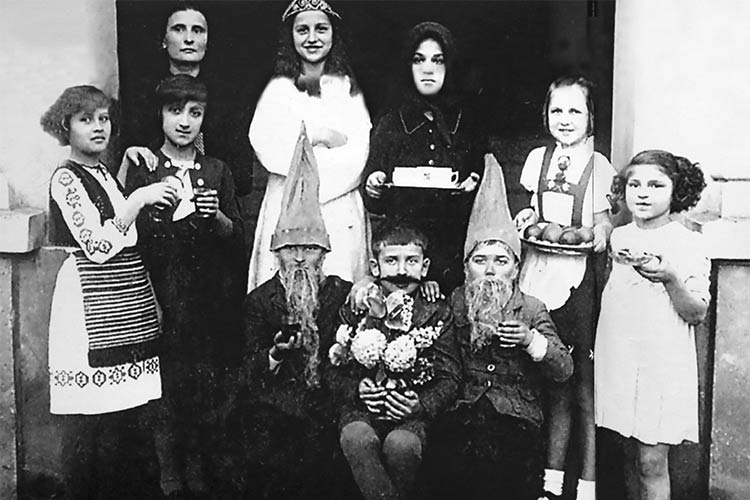
When I saw beautiful girls who, like me, had also come for the enrolment audition, wearing beautiful clothes and shoes, my mind was overrun with the thought: “…wow, I’m really in danger…”. The jury observed me in bewilderment, incredulity, wonder… When they collected themselves, they asked me: “What have you prepared?”, I responded: “Katerina from Ostrovsky’s The Storm”. I started, but it wasn’t good… They said: “Go ahead and recite something”, and that turned out even worse, until improvisation saved me. I gave my all in that. The task was – reacting to a situation – “I received a telegram in which it stated that my brother had died”. With unprecedented zeal, I portrayed the postman, read the letter and all the rest. I ultimately started smiling. They asked me why I was smiling and I said: “…I don’t have a brother…”. That prompted everyone to start laughing out loud. The next day, at eight in the morning, I read my name on the list of those accepted for enrolment.
You got married immediately after graduating, in 1950. And it was the following year that you gave birth to your only son, Branislav, or ‘Brana’, as you refer to him affectionately. Unfortunately, the marriage didn’t last long?
It is often the case that we expect one thing in life, and something else happens. Andrej Jovanović, an engineer by vocation, was my great love. We both joyously awaited Brana’s birth, and that was soon the only thing that united us. We realised that we weren’t suited to one another, that we differ completely, that we’re dissimilar… There were no ugly scenes, shifting of blame, torment etc. Discord and a lack of intimacy hovered in the air. Due to our disagreeable temperaments, different goals, we opted for the best solution: divorce. We broke up when Brana was five years old, so the divorce wasn’t traumatic for the child. We remained in contact and on friendly terms until Andrej’s death. I never remarried, and Brana was, and remains, my beloved and adored son; my greatest love.
Our generation had time to think studiously about everything, to work thoroughly… I don’t know, maybe they earn more now, but I think my generation was more satisfied, calmer and more serene… There’s a reason they say that everyone has their time, and every time has its own ways of working and living
You realised your dream by entering the world of acting?
I entered this magical world through school and ‘Saint Sava’ performances, amateur plays at the Youth Centre in Čukarica in Belgrade and through participation in the cultural team of the First Proletarian Corps Division. I received my first engagement at the City Theatre in Sremska Mitrovica (1949-‘51), after which I transferred to the Serbian National Theatre in Novi Sad (1951-‘53; 1955-‘70). I was a member of Atelije 212 in Belgrade until my retirement, in 1984. Of course, I continued to act. I didn’t really maintain statistics, but I’ve played around 300 roles, including around 160 in theatres, as well as film and television dramas and series. I’ve also had roles in both local and foreign works, by both classical and contemporary playwrights, and in a diverse range, from lyrical and character roles, to psychologically complex characters, in both plays and comedies.
You always point out with pride that your mother was your greatest support pillar in your life?
My mother was my greatest support pillar in everything. It saddens me when I think of how much she loved theatre, yet she didn’t live to see me become a serious actress. I was just a novice at the time she died, and neither of us knew how much I would progress. With the loss of her I lost my support pillar, one that had helped me overcome all problems during difficult times. At one point I thought: “… I’m not alone; I have my fellow actors…” There was also the wonderful Mira Stupica, who believed in me, encouraged me not to give up, to keep advancing.
What are your most significant theatre and film roles?
They’re all significant to me. Dramaturges and specialist experts single out: Zita in A Treatise on Maids, Bisa Zebić in The Village of Sakule, and in Banat, Jula in Priest Ćira and Priest Spira, Evica in Pokondirena tikva, Ljubica in Ljubica, first person plural, Meg in The Birthday, Katica in Radovan III, Our Lady in The Miracle in Shargan, Milica Njegovan in Korešpodencija, Nedovna in Maria, Simana in A Stone for A Pillow, Janina Jeguljevska in Mother, Mrs Goschted in Caroline Neuber and many others.
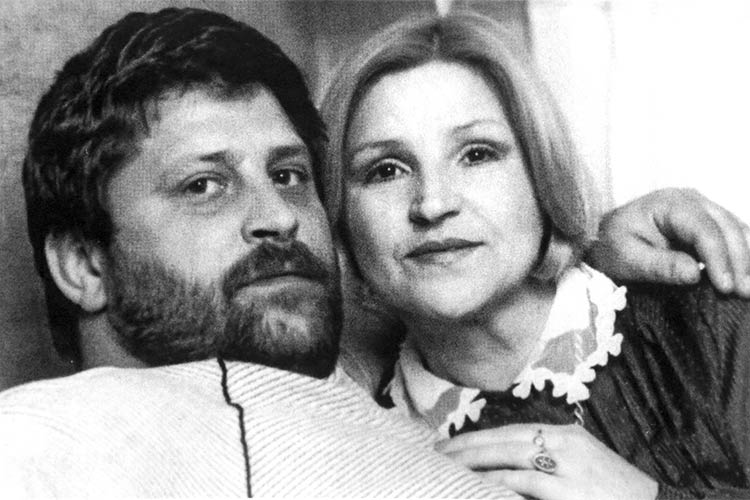
Of the thirty-odd film roles I’ve played, I would mention: Barren Dreams, Beach Guard in Winter, Don’t Lean Out the Window, Radio Whirlwind Calls Andjelija, The Farm in the Small Marsh, Majstori, majstori, Broad are the Leaves, Great Transport, The Balkan Spy, Do You Remember Dolly Bell?, Caught in the Throat, The Beauty of Vice, A Worker’s Life…
When it comes to television roles, I’ve played in about fifty films and mini-serial dramas, and just as many roles in series.
You’ve received the top guild awards and accolades for your work.
Yes, it’s tedious to list them: Dobrica’s Ring, the Žanka Stokić Award, the Golden Turkey, the Pavle Vuisić Award, the Ćuran Statuette, the Joakim Vujić Statuette, two Sterija Awards, two Golden Arenas, the Nušić Award… I was particularly surprised by the Paja Jovanović Lifetime Achievement Award, because I received it from Vojvodina, from my own Vojvodina. That award was given under the scope of the Novi Sad European Capital of Culture project, and it especially delighted me because it’s the first award with which Vojvodina honoured me for my life’s work. Every award is dear to me, but those that come spontaneously are special, for example, when a young man shouted to me while I was walking in Zagreb: “Danica, do you know where Vinča is?” (which is actually a line from Balkan Spy). I laugh and reply: “I know, and you?”, which isn’t a line from the film, which causes us all to giggle. And there were countless such precious acknowledgements…
You are a born fighter, an actress on a mission, a muse of Thalia and Melpomene, you have talent and potential, you conjure up reflections of the soul via words and movements. One great value of your acting is the ability to penetrate deep into the character of the persona and use your magic to convey that to the audience.
That’s natural with me. God endowed me with the ability to play roles of all specialities, from merry frolics to tragic black humour, from drama to tragedy. Talent is not enough. It’s also necessary for an actor to constantly advance, to increase their knowledge in order to reach the status of an acting authority. It is a compliment to me when I’m mentioned as the personification of Serbian acting, or when they dub me a Master of Acting. They also say that I’m a master of detail. I’m elated when I can take even the most insignificant episode and elevate it to the level of a first-class role that’s attractive and impressive for the audience.
Despite the size of the role, you’re always at the centre of the viewer’s attention.
I think that’s a matter of the energy that I convey on the stage and to the audience. I act as simply as possible, naturally… I seek out the features of the character, which are often deeply hidden within, and when I fathom them, I stylise them in my own way, in order to make it original. That’s research work that yields results and helps me to come up with the best acting solutions for the role I’m playing.
You are known as a measured, quiet, inconspicuous and polite woman, while you’re always noticed in public. People on the street, passing by, simply “stick” to you, approaching, wanting to chat. Do you listen to them patiently and always with a smile?
Those are all decent people, dear and overjoyed to be able to see “their” actress in an environment beyond the confines of the theatre. Many people have always loved my simplicity, temperament, willingness to joke around. I’m naturally communicative and talkative, spontaneous. It’s like I have a magnet that attracts people. I prefer that than if they turned their heads away from me. Now, because of the corona’, I rarely venture outside. That’s understandable, one should take care.
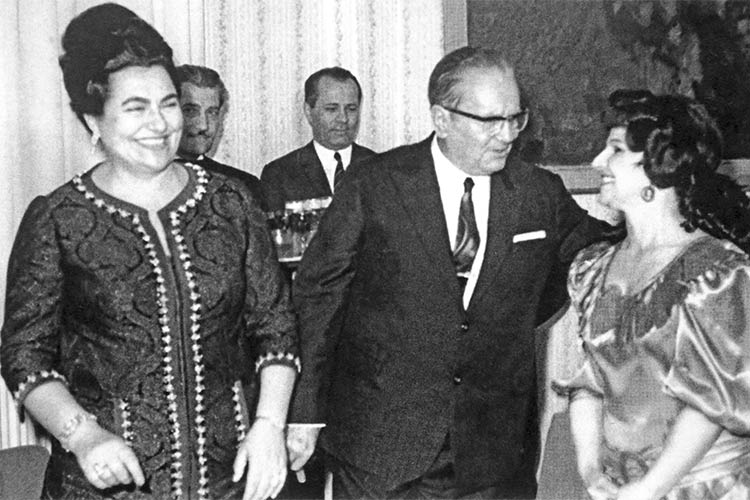
You are thrilled by the new generation of actors, which isn’t typical for older colleagues who always seem to think that their “class” was the best?
We’ve really always had great actors. We have them now, and we will have them in the future. A great generation of young actors has arrived, well-mannered, educated… I enjoy watching these young people develop and grow. I see that they are burdened with tasks, running from one television company to another, which takes their time for socialising. People now both live faster and work faster. Our generation had time to think studiously about everything, to work thoroughly…
I don’t know, maybe they earn more now, but I think my generation was more satisfied, calmer and more serene… There’s a reason they say that everyone has their time, and every time has its own ways of working and living.
You had many departed acquaintances and colleagues with whom you were a friend. You surely miss them?
Everything artists do remains in the people, and that never disappears. I worked with Zoran Radmilović, and recalling him is more than just a memory for me. You had to earn a friendship with Danilo ‘Bato’ Stojković, he was my on-stage husband. I miss my Petar Kralj, Pavle Vuisić, Miroslav Antić, Ružica Sokić, Mira Stupica… Many who were dear to me…
The important thing is that the people, whether Russian or Ukrainian, aren’t guilty of anything. The people aren’t even asked anything. I hope that some smart and acceptable solution will be found for both sides, for all those who could suffer in “this” or “that” way due to these quarrels
You possess an incredible transformational power?
Perhaps that’s down to some “Srem” trait in my character, who knows? I was satisfied to bring to life the beauty of simple unknown “heroines”, inconspicuous women, mothers, factory workers, peasant women… My genre orientation is towards characters of women from our region with comic values. I succeeded in interpreting many of my roles – such as Belinda, Zita, Bisa Zebić, Ikonija, Ljubica, Simana, Aunt Slavka, Dana Kandilarka, Marija… and those little nameless women – in such a way that they become significant and impressive. That’s an entire gallery of various personalities and diverse characters. They attracted me and I gave them all my skills, a new life. A life to remember. It was precisely because of these characteristics that I liked the monodrama Ljubica, first person plural.
Did you get scared by the coronavirus disease, which has hit all countries and all ages?
I initially followed all the regulations, convinced that it wouldn’t last. I spent my time arranging my library, personal documentation and paperwork that always accumulates, and I never have time to separate the important from the irrelevant and throw away the superfluous. I received supplies from the responsible service, I wasn’t lacking anything. As time passed, I realised that it wasn’t going to end anytime soon. The walls started choking me, and then I received a call to shoot and fluttered away.
The pandemic still hasn’t passed, but we are already facing a new problem: the Russian- Ukrainian conflict. And, like the virus, it has also expanded to become a worldwide problem?
I wouldn’t like to comment on the political reasons for everything that’s happening, because I certainly can’t influence that. The important thing is that the people, whether Russian or Ukrainian, aren’t guilty of anything. The people aren’t even asked anything. I hope that some smart and acceptable solution will be found for both sides, for all those who could suffer in “this” or “that” way due to these quarrels.
Throughout history, we know that certain countries have been subject to other people’s influences, to the influence of great powers. A state must know what is good for it and its people and be guided by that. Nobody needs to tailor anyone else’s destiny, let everyone be their own tailor.
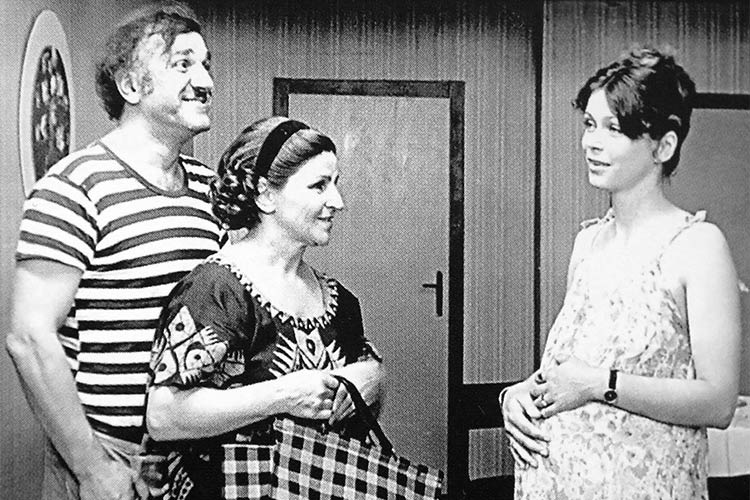
How do you feel as our oldest active actress? I’m happy when they call me for a shoot, and I’ll keep working as long as people want me. Work is life for me. I live to work and work to live. That’s what moves me, gives my life meaning… You live for as long as you work. For me, work is the “law of life”. That’s my motto. One should definitely respect one’s age. To developing an understanding with one’s years. Old age must be dignified, it should be pleasurable, you mustn’t deprive it of anything and, on the contrary, should give it everything it deserves. I’m devoted to my work, but one should approach everything wisely and prudently.
To what do you owe your longevity, and in the tenth decade of your life, despite the cigarette holder mouthpiece, you remain mentally and physically rugged?
I don’t think about age. I don’t fear death. I’m ready for the journey, only a few stations remain until my train arrives. I’m in no hurry. Until that happens, I live normally. I get up early, sweeten up with honey, with a glass of water, drink coffee and smoke a cigarette. Smoking is my pleasure. I then have breakfast. I read a lot, I work a lot, I’m interested in daily happenings, events in cinematography, theatre; I like to be up to date on everything.
By Zorica Todorović Mirković, Main photo: ATA Images Antonio Ahel